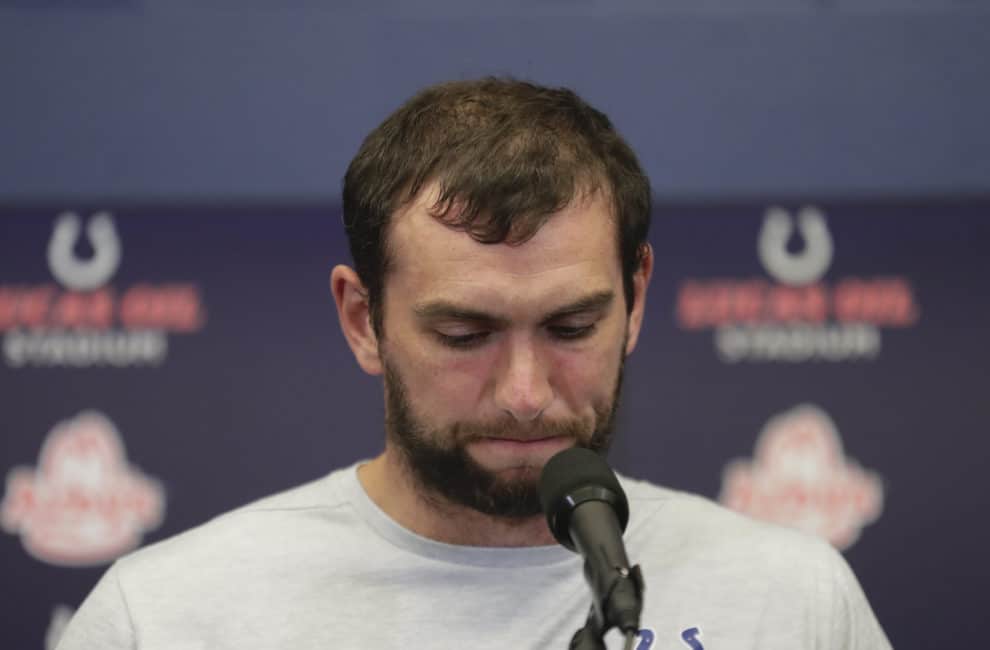Luck Said No To The NFL—Why Can’t We?

Indianapolis Colts quarterback Andrew Luck speaks during a news conference following an NFL preseason football game against the Chicago Bears, Saturday, Aug. 24, 2019, in Indianapolis. The oft-injured star is retiring at age 29. (AP Photo/Michael Conroy)
As Andrew Luck—who shocked the world Saturday night by retiring with his best playing years seemingly ahead—was checking into the NFL in 2012, I was on the verge of checking out due to a spate of tragic revelations that called the league’s moral acceptability into question.
Less than two weeks after Luck was picked No. 1 overall by the Colts, Junior Seau, an NFL icon whose storied career as a linebacker spanned two decades, pointed a .357 Magnum toward his heart and pulled the trigger.
Nine months later, the National Institutes of Health conducted an independent postmortem of Seau’s brain, posthumously diagnosing him with chronic traumatic encephalopathy (CTE), a degenerative disease that causes memory loss, depression, and dementia.
Just as Luck was entering his second season, PBS aired the Frontline documentary “League of Denial.” It revealed a years-long campaign on the part of the NFL to systematically conceal the link between football and CTE. The documentary was a powerful indictment of the NFL as an institution with few, if any, qualms about endangering human lives for profit.
Watching the documentary, I was reminded of Dave Duerson, who hailed from my hometown of Muncie. A star safety for the Super Bowl–winning 1985 Chicago Bears, Duerson was a hero to me in my grade-school days. In 2011, he committed suicide in the same manner as Seau, with a single gunshot to the chest. Duerson left a note requesting that his brain be examined for CTE. An excerpt from it reads: “My mind slips. Thoughts get crossed. Cannot find my words. Major growth on the back of skull on lower left side … I cannot tell you how many times I saw stars in games.” The tests came back positive.
In the wake of Duerson and Seau’s deaths—and after viewing the damning “League of Denial”—I wondered how I could justify giving my attention to a league that clearly didn’t give a damn about the welfare of its players. But something about Andrew Luck—this weirdly smart, self-effacing, nerdy guy from Stanford—kept me coming back. Unlike Peyton Manning, who was a football-obsessed automaton dipped in frat-house sensibilities, Luck was someone I could actually identify with. The way I saw it, if a nerd like him could rationalize playing for the NFL, a nerd like me could rationalize watching it.
So I did. But instead of an NFL fan, I saw myself as an Andrew Luck fan. I suppose I thought this subtle shift in self-identification permitted me to support a morally corrupt league without implicating myself. That’s not true, of course. But when you’ve spent your entire life in thrall to professional sports, it’s easy to miss the inconvenient truth of the forest for the dopamine-boosting trees.
This is why the most devout NFL fans—such as the ones who actually go to preseason football games and stay until the end—booed Luck last Saturday night after word leaked of his retirement. While professional sports are billed as “entertainment,” they are more of a cultish obsession for their most extreme followers. When someone of Luck’s status suddenly ditches the fiction of the cult for real-world pursuits, it creates a glitch-in-the-matrix moment. So the followers revolt.
We’re all susceptible to getting swept up in the mob mentality of fandom to some degree. It’s what you sign up for when you emotionally invest in a sports team. But most of us—after some reflection, maybe a stiff drink or two, and a good night’s sleep—eventually come to our senses. In this case, under the harsh light of a new day, most of us could see the very real and treacherous forest that Andrew Luck was struggling to navigate. So we said “good luck” to him on his nerdy post-NFL adventure, and got on with our lives.
But an alarming number of fans seem to have avoided this type of clear-headed reflection with white-knuckled fervor. To them, Luck remains a quitter, a traitor. Sadly, the toxic foolishness has been encouraged by some sports media types who are either cynically pandering or, worse, just as fooled by the pageantry and propaganda of the NFL as some fans are. Take Dan Dakich, who, in the wake of Luck’s announcement, positioned himself as a man of the people—first by questioning Luck’s heart and then by trafficking in bizarre conspiracy theories.
Meanwhile, the real fraud is right in front of our faces. The NFL doesn’t just have a concussion problem. It has a violence-against-women problem. A painkiller problem. Even an ED problem.
If this described your workplace, would you keep working there if you had to? Would you respect someone who did?
Sports-media folks like Dakich are mostly annoyed because Luck had the guts, in his own sheepish way, to reject the entire premise that the NFL is worthy of sacrifice. “I came to the proverbial fork in the road and made a vow if I ever did again, I would choose me, in a sense,” he said upon retiring rather than rehabbing from injury. Luck didn’t so much quit as he started a new life in the real world—not the mythical one fabricated by the sports industrial complex.
And his departure raises an uncomfortable question for me and everyone else who watches NFL football: If he can walk away, why can’t the rest of us?





